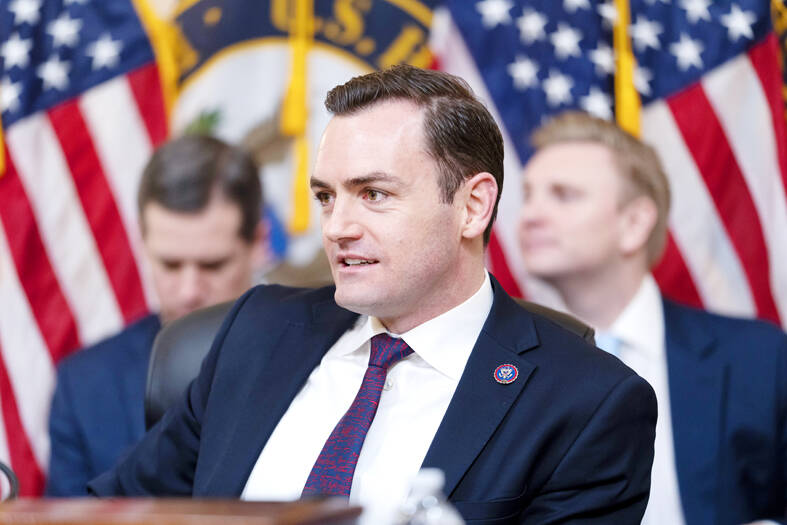A bipartisan group of US lawmakers is taking their concerns about China to California this week, where they plan to meet President Tsai Ing-wen (蔡英文) along with top technology and entertainment executives.
The trip — led by US Representative Mike Gallagher, a Wisconsin Republican who chairs the US House Select Committee on China — is aimed at understanding how the Chinese Communist Party (CCP) influences US social values and discourse, a person familiar with the committee’s plans said.
About half a dozen lawmakers are to begin their trip in Los Angeles on Wednesday, where they are scheduled to meet with Walt Disney Co CEO Bob Iger and other producers and screenwriters to talk about Beijing’s demands on US films in exchange for access to the Chinese market, the person said.

Photo: AP
The lawmakers are expected to ask how the CCP inserts its narrative — and scrubs objectionable content — not just in films shown in China, but also in global productions in a way that undermines the soft power of exporting US culture.
That stop is to include a meeting with Tsai during her stopover as she returns from an official visit to Guatemala and Belize, the person said.
Tsai is also expected to meet with US House of Representatives Speaker Kevin McCarthy, a California Republican, in his home state.
She met last week with US House of Representatives Minority Leader Hakeem Jeffries, the top House Democrat, in his home state of New York, people familiar with the event said.
Taiwan’s Presidential Office has declined to confirm Tsai’s planned meetings in advance.
The group on Thursday is to have lunch in the San Francisco Bay Area with executives from Alphabet Inc’s Google, Microsoft Corp, Palantir Technologies Inc and Apple Inc CEO Tim Cook, the person said, adding that dinner that night is to include several prominent venture capitalists, including Marc Andreessen and Vinod Khosla.
The China committee under Gallagher’s leadership has sought out forums beyond the traditional hearing room on Capitol Hill to understand all aspects of the “strategic competition” between the world’s two largest economies.
The committee’s conversations with private-sector leaders are taking place as US companies across the economy re-evaluate their exposure to China and their reliance on its consumers and supply chains.
US relations with China have been strained over China’s support for Russia, a spy balloon that flew over the US and bipartisan calls in Washington to ban the popular video-sharing app TikTok because of its Chinese parent, ByteDance Inc.
Gallagher and US Representative Raja Krishnamoorthi, the top Democrat on the China Committee, who is scheduled to be on the trip, co-sponsored one of several bills seeking to block TikTok from operating in the US.
Some industries are of particular concern, including pharmaceuticals, rare earth minerals, artificial intelligence and quantum computing, the person said.
The conversations are to focus on how the US government and the private sector need to work together to confront the threat from China, the person added.

An essay competition jointly organized by a local writing society and a publisher affiliated with the Chinese Communist Party (CCP) might have contravened the Act Governing Relations Between the People of the Taiwan Area and the Mainland Area (臺灣地區與大陸地區人民關係條例), the Mainland Affairs Council (MAC) said on Thursday. “In this case, the partner organization is clearly an agency under the CCP’s Fujian Provincial Committee,” MAC Deputy Minister and spokesperson Liang Wen-chieh (梁文傑) said at a news briefing in Taipei. “It also involves bringing Taiwanese students to China with all-expenses-paid arrangements to attend award ceremonies and camps,” Liang said. Those two “characteristics” are typically sufficient

The brilliant blue waters, thick foliage and bucolic atmosphere on this seemingly idyllic archipelago deep in the Pacific Ocean belie the key role it now plays in a titanic geopolitical struggle. Palau is again on the front line as China, and the US and its allies prepare their forces in an intensifying contest for control over the Asia-Pacific region. The democratic nation of just 17,000 people hosts US-controlled airstrips and soon-to-be-completed radar installations that the US military describes as “critical” to monitoring vast swathes of water and airspace. It is also a key piece of the second island chain, a string of

A magnitude 5.9 earthquake that struck about 33km off the coast of Hualien City was the "main shock" in a series of quakes in the area, with aftershocks expected over the next three days, the Central Weather Administration (CWA) said yesterday. Prior to the magnitude 5.9 quake shaking most of Taiwan at 6:53pm yesterday, six other earthquakes stronger than a magnitude of 4, starting with a magnitude 5.5 quake at 6:09pm, occurred in the area. CWA Seismological Center Director Wu Chien-fu (吳健富) confirmed that the quakes were all part of the same series and that the magnitude 5.5 temblor was

The Central Weather Administration has issued a heat alert for southeastern Taiwan, warning of temperatures as high as 36°C today, while alerting some coastal areas of strong winds later in the day. Kaohsiung’s Neimen District (內門) and Pingtung County’s Neipu Township (內埔) are under an orange heat alert, which warns of temperatures as high as 36°C for three consecutive days, the CWA said, citing southwest winds. The heat would also extend to Tainan’s Nansi (楠西) and Yujing (玉井) districts, as well as Pingtung’s Gaoshu (高樹), Yanpu (鹽埔) and Majia (瑪家) townships, it said, forecasting highs of up to 36°C in those areas